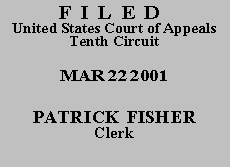

| In re:
GONZALO GOMEZ-OLIVAS, also known as Anthony M. Flores, Petitioner.
UNITED STATES OF AMERICA, Plaintiff-Appellee, v. GONZALO GOMEZ-OLIVAS, Defendant-Appellant. |
|
In case No. 00-8082, petitioner asks this court to issue a writ of mandamus directing the district court to hear and decide his motion filed in that court pursuant to 28 U.S.C. § 2255. In case No. 00-8094, petitioner seeks review on direct appeal from an order of the district court granting the government an extension of time in which to respond to his § 2255 motion. In the interest of judicial efficiency, we have combined these two matters.
Mandamus is an extraordinary remedy, and a petitioner must demonstrate a clear and indisputable right to such relief. Weston v. Mann (In re Weston), 18 F.3d 860, 864 (10th Cir. 1994). With regard to this petition, we note that the § 2255 matter has been pending in the district court for less than six months, an insufficient delay to warrant mandamus relief. Cf. Johnson v. Rogers, 917 F.2d 1283, 1285 (10th Cir. 1990). The petition for mandamus is therefore DENIED.
Turning to case No. 00-8094, Mr. Gomez-Olivas asks us to review an order of the district court extending the time in which the government could respond to his § 2255 motion. The jurisdiction of this court to review decisions of the district court in actions brought under § 2255 is limited--with exceptions not relevant here--to "final decisions" of the district court. 28 U.S.C. § 1291; United States v. Blackwell, 127 F.3d 947, 950-51 (10th Cir. 1997). A "final" decision is one that "'ends the litigation on the merits and leaves nothing for the court to do but execute the judgment.'" Coopers & Lybrand v. Livesay, 437 U.S. 463, 467 (1978) (quoting Catlin v. United States, 324 U.S. 229, 233 (1945)). Under this standard, it is clear that the order appealed from is not a final decision. Mr. Gomez-Olivas' motion to proceed on appeal without prepayment of costs or fees is GRANTED. This appeal is DISMISSED.
Entered for the Court
Circuit Judge
*. This order and judgment is not binding precedent, except under the doctrines of law of the case, res judicata, and collateral estoppel. The court generally disfavors the citation of orders and judgments; nevertheless, an order and judgment may be cited under the terms and conditions of 10th Cir. R. 36.3.